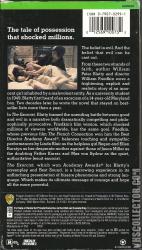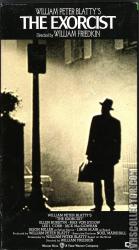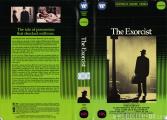The Exorcist
Catalog Number
1007
-
Primary Distributor (If not listed, select "OTHER")
Catalog Number
1007
Primary Distributor (If not listed, select "OTHER")
Release Year
Country
N/A (NTSC)
N/A | N/A | N/A
N/A | N/A
The Exorcist (1973)
Additional Information
Additional Information
Somewhere between science and superstition, there is another world. The world of darkness.
Nobody expected it, nobody believed it, and nobody could stop it. The one hope, the only hope: THE EXORCIST
Novelist William Peter Blatty based his best-seller on the last known Catholic-sanctioned exorcism in the United States. Blatty transformed the little boy in the 1949 incident into a little girl named Regan, played by 14-year-old Linda Blair. Suddenly prone to fits and bizarre behavior, Regan proves quite a handful for her actress-mother, Chris MacNeil (played by Ellen Burstyn, although Blatty reportedly based the character on his next-door neighbor Shirley MacLaine). When Regan gets completely out of hand, Chris calls in young priest Father Karras (Jason Miller), who becomes convinced that the girl is possessed by the Devil and that they must call in an exorcist: namely, Father Merrin (Max von Sydow). His foe proves to be no run-of-the-mill demon, and both the priest and the girl suffer numerous horrors during their struggles. The Exorcist received a theatrical rerelease in 2000, in a special edition that added 11 minutes of footage trimmed from the film's original release and digitally enhanced Chris Newman's Oscar-winning sound work.
The Exorcist is a 1973 American horror film directed by William Friedkin, adapted by William Peter Blatty from his 1971 novel of the same name. The book, inspired by the 1949 exorcism case of Roland Doe,[3][4] deals with the demonic possession of a young girl and her mother's desperate attempts to win back her daughter through an exorcism conducted by two priests.
The film features Ellen Burstyn, Max von Sydow, Jason Miller, Lee J. Cobb, Linda Blair, and (in voice only) Mercedes McCambridge. It is one of a cycle of "demonic child" films produced from the late 1960s to the mid-1970s, including Rosemary's Baby and The Omen.
The Exorcist was released theatrically in the United States by Warner Bros. on December 26, 1973. The film earned ten Academy Award nominations, winning two (Best Sound Mixing and Best Adapted Screenplay), and losing Best Picture to The Sting. It became one of the highest-grossing films of all time, grossing over $441 million worldwide. It is also the first horror film to be nominated for Best Picture.
The film has had a significant influence on popular culture.[5][6] It was named the scariest film of all time by Entertainment Weekly[7] and Movies.com[8] and by viewers of AMC in 2006, and was No. 3 on Bravo's The 100 Scariest Movie Moments.[9][dead link] In 2010, the Library of Congress selected the film to be preserved as part of its National Film Registry.[10][11] In 2003, it was placed at No. 2 in Channel 4's The 100 Greatest Scary Moments in the United Kingdom.
Upon its December 26, 1973, release, the film received mixed reviews from critics, "ranging from 'classic' to 'claptrap'."[28] Stanley Kauffmann, in The New Republic, wrote, "This is the scariest film I've seen in years—the only scary film I've seen in years ... If you want to be shaken—and I found out, while the picture was going, that that's what I wanted—then The Exorcist will scare the hell out of you."[29] Variety noted that it was "an expert telling of a supernatural horror story ... The climactic sequences assault the senses and the intellect with pure cinematic terror."[30] In Castle of Frankenstein, Joe Dante called it "an amazing film, and one destined to become at the very least a horror classic. Director Friedkin's film will be profoundly disturbing to all audiences, especially the more sensitive and those who tend to 'live' the movies they see ... Suffice it to say, there has never been anything like this on the screen before."[31]
However, Vincent Canby, writing in The New York Times, dismissed The Exorcist as "a chunk of elegant occultist claptrap ... a practically impossible film to sit through ... It establishes a new low for grotesque special effects ..."[32] Andrew Sarris complained that "Friedkin's biggest weakness is his inability to provide enough visual information about his characters ... whole passages of the movie's exposition were one long buzz of small talk and name droppings ... The Exorcist succeeds on one level as an effectively excruciating entertainment, but on another, deeper level it is a thoroughly evil film."[33] Writing in Rolling Stone, Jon Landau felt the film was "nothing more than a religious porn film, the gaudiest piece of shlock this side of Cecil B. DeMille (minus that gentleman's wit and ability to tell a story) ... "[34] Writing in 2012, author James K. Morrow disliked the film on similar grounds:
"From the first frame to the last, The Exorcist serves up a feckless Manichean attack on the Enlightenment, rigging the discourse at every turn. On one side we have the forces of darkness: clueless physicians in lab coats, blinded by their materialism, blithely torturing a demonically possessed child with their diagnostic instruments... What I find most exasperating about this movie and the novel before it is Blatty and Friedkin's stupefyingly unimaginative notion of radical evil. You know, Radical Evil, that phenomenon we secular humanists are continually told we fail to appreciate. In the world of The Exorcist, the Devil's agenda comes down to one thing and one thing only: the sex act. For Friedkin and Blatty, human reproductive organs are the sine qua non of chaos, depravity, and filth.... Not one of the 'obscene' utterances spewed forth by Pazuzu touches on historical or social evils. Pazuzu files no briefs on behalf of war, slavery, misogyny, anti-Semitism, homophobia, or pedophilia. Can it be a coincidence that, at certain points in its ragged history, the Catholic Church has acquiesced to all six of those institutions?... The wife of the police inspector, played by Lee J. Cobb, no longer enjoys watching movies with him—get it? When The Exorcist isn't busy wagging its index finger at secular reason, it gives its middle digit to anyone who would presume to find redemption in the erotic."[35]
Over the years, The Exorcist's critical reputation has grown considerably. The film currently has an 87% "Certified Fresh" approval rating on the Rotten Tomatoes website, based on 47 reviews the website collected.[36] Some critics regard it as being one of the best and most effective horror films of all time. Chicago Tribune film critic Gene Siskel placed it in the top five films released that year.[37] However, the film has its detractors as well, including Kim Newman who has criticized it for messy plot construction, conventionality and overblown pretentiousness, among other perceived defects. Writer James Baldwin provides an extended negative critique in his book length essay The Devil Finds Work.[citation needed] Director Martin Scorsese placed The Exorcist on his list of the 11 scariest horror films of all time.[38] In 2008, the film was selected by Empire Magazine as one of The 500 Greatest Movies Ever Made.[39] It was also placed on a similar list of 1000 films by The New York Times.[40]
Box office[edit]
The film earned $66.3 million in distributors' domestic (US/CAN) rentals during its theatrical release in 1974, becoming the second most popular film of that year (trailing The Sting).[41] After several reissues, the film eventually grossed $232,671,011 in North America,[42] which if adjusted for inflation, would be the ninth highest-grossing film of all time and the top-grossing R-rated film of all time.[43] To date, it has a total gross of $441,071,011 worldwide.
Release Date: December 26, 1973
Distrib: Warner Brothers
Boxoffice: $193,000,000 2013: $819,475,900
Nobody expected it, nobody believed it, and nobody could stop it. The one hope, the only hope: THE EXORCIST
Novelist William Peter Blatty based his best-seller on the last known Catholic-sanctioned exorcism in the United States. Blatty transformed the little boy in the 1949 incident into a little girl named Regan, played by 14-year-old Linda Blair. Suddenly prone to fits and bizarre behavior, Regan proves quite a handful for her actress-mother, Chris MacNeil (played by Ellen Burstyn, although Blatty reportedly based the character on his next-door neighbor Shirley MacLaine). When Regan gets completely out of hand, Chris calls in young priest Father Karras (Jason Miller), who becomes convinced that the girl is possessed by the Devil and that they must call in an exorcist: namely, Father Merrin (Max von Sydow). His foe proves to be no run-of-the-mill demon, and both the priest and the girl suffer numerous horrors during their struggles. The Exorcist received a theatrical rerelease in 2000, in a special edition that added 11 minutes of footage trimmed from the film's original release and digitally enhanced Chris Newman's Oscar-winning sound work.
The Exorcist is a 1973 American horror film directed by William Friedkin, adapted by William Peter Blatty from his 1971 novel of the same name. The book, inspired by the 1949 exorcism case of Roland Doe,[3][4] deals with the demonic possession of a young girl and her mother's desperate attempts to win back her daughter through an exorcism conducted by two priests.
The film features Ellen Burstyn, Max von Sydow, Jason Miller, Lee J. Cobb, Linda Blair, and (in voice only) Mercedes McCambridge. It is one of a cycle of "demonic child" films produced from the late 1960s to the mid-1970s, including Rosemary's Baby and The Omen.
The Exorcist was released theatrically in the United States by Warner Bros. on December 26, 1973. The film earned ten Academy Award nominations, winning two (Best Sound Mixing and Best Adapted Screenplay), and losing Best Picture to The Sting. It became one of the highest-grossing films of all time, grossing over $441 million worldwide. It is also the first horror film to be nominated for Best Picture.
The film has had a significant influence on popular culture.[5][6] It was named the scariest film of all time by Entertainment Weekly[7] and Movies.com[8] and by viewers of AMC in 2006, and was No. 3 on Bravo's The 100 Scariest Movie Moments.[9][dead link] In 2010, the Library of Congress selected the film to be preserved as part of its National Film Registry.[10][11] In 2003, it was placed at No. 2 in Channel 4's The 100 Greatest Scary Moments in the United Kingdom.
Upon its December 26, 1973, release, the film received mixed reviews from critics, "ranging from 'classic' to 'claptrap'."[28] Stanley Kauffmann, in The New Republic, wrote, "This is the scariest film I've seen in years—the only scary film I've seen in years ... If you want to be shaken—and I found out, while the picture was going, that that's what I wanted—then The Exorcist will scare the hell out of you."[29] Variety noted that it was "an expert telling of a supernatural horror story ... The climactic sequences assault the senses and the intellect with pure cinematic terror."[30] In Castle of Frankenstein, Joe Dante called it "an amazing film, and one destined to become at the very least a horror classic. Director Friedkin's film will be profoundly disturbing to all audiences, especially the more sensitive and those who tend to 'live' the movies they see ... Suffice it to say, there has never been anything like this on the screen before."[31]
However, Vincent Canby, writing in The New York Times, dismissed The Exorcist as "a chunk of elegant occultist claptrap ... a practically impossible film to sit through ... It establishes a new low for grotesque special effects ..."[32] Andrew Sarris complained that "Friedkin's biggest weakness is his inability to provide enough visual information about his characters ... whole passages of the movie's exposition were one long buzz of small talk and name droppings ... The Exorcist succeeds on one level as an effectively excruciating entertainment, but on another, deeper level it is a thoroughly evil film."[33] Writing in Rolling Stone, Jon Landau felt the film was "nothing more than a religious porn film, the gaudiest piece of shlock this side of Cecil B. DeMille (minus that gentleman's wit and ability to tell a story) ... "[34] Writing in 2012, author James K. Morrow disliked the film on similar grounds:
"From the first frame to the last, The Exorcist serves up a feckless Manichean attack on the Enlightenment, rigging the discourse at every turn. On one side we have the forces of darkness: clueless physicians in lab coats, blinded by their materialism, blithely torturing a demonically possessed child with their diagnostic instruments... What I find most exasperating about this movie and the novel before it is Blatty and Friedkin's stupefyingly unimaginative notion of radical evil. You know, Radical Evil, that phenomenon we secular humanists are continually told we fail to appreciate. In the world of The Exorcist, the Devil's agenda comes down to one thing and one thing only: the sex act. For Friedkin and Blatty, human reproductive organs are the sine qua non of chaos, depravity, and filth.... Not one of the 'obscene' utterances spewed forth by Pazuzu touches on historical or social evils. Pazuzu files no briefs on behalf of war, slavery, misogyny, anti-Semitism, homophobia, or pedophilia. Can it be a coincidence that, at certain points in its ragged history, the Catholic Church has acquiesced to all six of those institutions?... The wife of the police inspector, played by Lee J. Cobb, no longer enjoys watching movies with him—get it? When The Exorcist isn't busy wagging its index finger at secular reason, it gives its middle digit to anyone who would presume to find redemption in the erotic."[35]
Over the years, The Exorcist's critical reputation has grown considerably. The film currently has an 87% "Certified Fresh" approval rating on the Rotten Tomatoes website, based on 47 reviews the website collected.[36] Some critics regard it as being one of the best and most effective horror films of all time. Chicago Tribune film critic Gene Siskel placed it in the top five films released that year.[37] However, the film has its detractors as well, including Kim Newman who has criticized it for messy plot construction, conventionality and overblown pretentiousness, among other perceived defects. Writer James Baldwin provides an extended negative critique in his book length essay The Devil Finds Work.[citation needed] Director Martin Scorsese placed The Exorcist on his list of the 11 scariest horror films of all time.[38] In 2008, the film was selected by Empire Magazine as one of The 500 Greatest Movies Ever Made.[39] It was also placed on a similar list of 1000 films by The New York Times.[40]
Box office[edit]
The film earned $66.3 million in distributors' domestic (US/CAN) rentals during its theatrical release in 1974, becoming the second most popular film of that year (trailing The Sting).[41] After several reissues, the film eventually grossed $232,671,011 in North America,[42] which if adjusted for inflation, would be the ninth highest-grossing film of all time and the top-grossing R-rated film of all time.[43] To date, it has a total gross of $441,071,011 worldwide.
Release Date: December 26, 1973
Distrib: Warner Brothers
Boxoffice: $193,000,000 2013: $819,475,900
Related Links
Related Releases5
Catalog Number
NONE
Primary Distributor (If not listed, select "OTHER")
The Exorcist (1973)
Release Year
Catalog Number
NONE
Primary Distributor (If not listed, select "OTHER")
Catalog Number
NONE
Catalog Number
16336
Primary Distributor (If not listed, select "OTHER")
The Exorcist (1973)
Release Year
Catalog Number
16336
Primary Distributor (If not listed, select "OTHER")
Catalog Number
16336
Catalog Number
WB 1007
Primary Distributor (If not listed, select "OTHER")
The Exorcist (1973)
Release Year
Catalog Number
WB 1007
Primary Distributor (If not listed, select "OTHER")
Catalog Number
WB 1007
Catalog Number
16176
Primary Distributor (If not listed, select "OTHER")
The Exorcist (1973)
Release Year
Catalog Number
16176
Primary Distributor (If not listed, select "OTHER")
Catalog Number
16176
Catalog Number
1007
Primary Distributor (If not listed, select "OTHER")
The Exorcist (1973)
Release Year
Catalog Number
1007
Primary Distributor (If not listed, select "OTHER")
Catalog Number
1007













Comments0
Login / Register to post comments